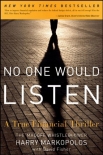No One Would Listen: A True Financial Thriller by Harry Markopolos (rainbow fish read aloud .txt) 📗

- Author: Harry Markopolos
Book online «No One Would Listen: A True Financial Thriller by Harry Markopolos (rainbow fish read aloud .txt) 📗». Author Harry Markopolos
“I knew all about Bernie from her father. He’d had most of his money with Bernie forever and he couldn’t stop talking about it. Bernie this, Bernie that. Bernie’ll give you the best returns with no risk. He wanted me to get in right away. But before I did anything I took a look at his strategy. Frank, believe me, I don’t know that much about derivatives, but I couldn’t figure out how his returns could be so steady if he was doing what he said he was doing. I decided not to give him any of our money until I could get some answers. So I declined.
“You can imagine what that’s done to my relationship with my father-in-law. Every time I see him it’s ‘Why haven’t you called Bernie?’ He’s like ‘It’s your job now as my son-in-law to take care of my daughter, and you should be putting your money with Bernie. He’ll take care of you.’ It’s really causing a problem in the family. My father-in-law’s making a real issue about this.”
Frank smiled at that. “Boy, did you nail it,” he said. “What we can’t understand is why nobody else seems to be able to figure it out. We think he’s going to blow soon.”
The executive took a long, deep breath. “What I really want to do is convince him to get his money out as soon as possible. I’m sick and tired of listening to him, and I’m really afraid my wife is going to lose her inheritance. Can you help me? Can you put any of what you just told me in writing?”
Frank laughed at that suggestion. “Oh sure,” he said. “I don’t think so—I don’t want a bullet in my head. Sorry.”
The executive practically begged him. “Frank, I’m afraid my wife’s gonna lose everything if you don’t help me,” he said. “Her father isn’t going to listen to me unless I have some proof.” Frank thought about it. And then he sat down and wrote a long e-mail, using as his foundation the red flags from my 2005 submission to the SEC. He knew it was risky, that it could put him in jeopardy, but he felt he had a moral obligation to help. He also knew, when he paused to think about it, that it was really a stupid thing to do.
Knowing that there was a real chance this person might confront Bernie with this information, he did as much as possible to protect himself. Rather than just scanning in the submission, he created a completely new document, eliminating several of the most technical points as well as anything that might lead back to me. He changed the order, renumbered the flags, and substituted the phrase unknown scheme for Ponzi scheme because he didn’t want to be out in public with that accusation. At the top of the e-mail he wrote a disclaimer, stating that this was not his opinion and certainly not his firm’s opinion, but that he had run into an unnamed analyst extremely knowledgeable about derivatives, who had shown him these red flags. “I’m not stating that the analyst has it nailed,” he wrote. “I haven’t done my due diligence on this analyst. I present this information solely for your own use and you have to do your own due diligence.”
Then he moved the cursor to the upper lefthand corner of his screen and hit send. And then forgot all about it. It would be more than a month before he received a response, and by that time the whole world had changed.
It’s impossible to pinpoint the moment at which Bernie Madoff realized it was over for him. It wasn’t beauty that killed this beast; it was the cold numbers. As it turned out, the market that Madoff had dominated for decades finally destroyed him.
Beginning sometime in 2007 the world financial system was staggered when the American housing bubble burst. Millions of people who had been living on the rising equity in their homes saw that cushion disappear. Within several months trillions of dollars in real estate value was lost. People with low-interest adjustable-rate mortgages saw their payments rise and could no longer afford those mortgages, causing banks to foreclose. Banks had issued millions of those mortgages to people who were not financially qualified and whose only viable exit strategy was to sell their homes at a higher price, but these homeowners now saw that option collapse. Investment firms had wrapped those mortgages into financial products called mortgage-backed securities. Those securities had been sold as high-quality assets, but in fact were low-quality realty. They were also very illiquid, and when people realized there was little or no underlying value to them and saw no new buyers coming into the markets, their value plunged.
It was like a big game of musical chairs, but in this game when the music stopped those institutions holding these securities were out hundreds of billions of dollars. Within two years the American housing market had lost about 20 percent of its value. As the market collapsed, banks stopped lending and the years of easily obtainable credit ended. Even people and businesses with really good credit couldn’t get loans. At the same time commodity prices, especially oil, rose rapidly. By September 2008, this had become a global financial crisis. Banks began closing. There was a real sense of panic as the media wondered if we were on the edge of a second Great Depression.
The stock market, which had been in a somewhat orderly decline for about a year, suddenly began dropping fast. In October, the head of the International Monetary Fund warned that the





Comments (0)